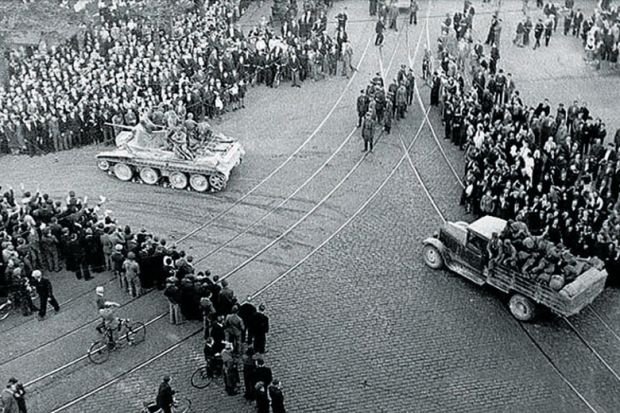Famously, E. H. Carr once gave his fellow historians the jolly advice to study “the historian before you begin to study the facts”. He went on to say: “when you read a work of history, always listen out for the buzzing”. Underneath the pure strings of Clio’s lyre, as a Victorian clergyman might put it, hums the industrial techno-grunge of the historian’s personal concerns, political allegiances and so on: their own life, in short. In Mischka’s War, like some West German experimental noisenik, Sheila Fitzpatrick, an eminent historian of Soviet Russia, has turned the buzzing right up and the strings right down: the book is about her late husband, Michael Danos.
Fitzpatrick has form for writing on the border between memoir and history (her fascinating A Spy in the Archives, for example). But this is slightly different: it’s not her life, but her husband’s, and throughout the book she wrestles with the rights and wrongs of this, unwilling to betray his memory, but unwilling also to betray her “historian’s Hippocratic oath… ‘don’t leave things out because you don’t like them’”.
His story is certainly full and, as she says, singular. Born in Riga, Danos experiences first the Soviet occupation (terrible: “when there was danger around, you had to go on ‘autopilot’…and make yourself as still and unnoticeable as possible, all the while looking for a chance to melt away from the scene of danger”); then the German occupation (better, if you weren’t Jewish). He witnesses a mass grave and tells his mother, Olga: she knows, she’d been hiding Jews and helping them to escape. In 1944, he leaves Riga heading not east but west, to Nazi Germany. The logic of going into the “Lion’s Den” was simple: if he stayed in Riga, “he would be called up; if he went to Germany, he wouldn’t be”. There, he is on a date on the outskirts of Dresden when it is firebombed: his diaries give a remarkable account of the destruction and the aftermath, and of his own responses. His time as a Displaced Person in the West conveys the confusion of the immediate post-war period and the book ends with his and his mother’s emigration to New York (“we made it!”). That’s the melody.
The historiographical lesson, the buzzing, is more complex: archival work, Fitzpatrick writes, favours “the general and the typical”, but individual histories show up the “anomalies, divergences”: one’s late husband might deserve an encomium, but a historical subject needs to be seen warts and all. The book aims at – and achieves – the balance. Not a memoir, not a biography, not a history, but each, reflective and blended.
Creative artists are sometimes thought to have a “late style”, a movement beyond the work that established them to something that is simpler (The Tempest is more like a fable), somehow distils the “central theme” of their career and yet looks forward to a future that they won’t see. Perhaps historians have a “late style” too: having mastered the tight constraints of historical writing (Clio’s strings bind as well as play), they turn to a freedom that offers a profounder understanding of what history can be.
Robert Eaglestone is professor of contemporary literature and thought at Royal Holloway, University of London. The Broken Voice: Reading Post-Holocaust Literature and the fourth edition of Doing English were both published this year.
Mischka’s War: A Story of Survival from War-Torn Europe to New York
By Sheila Fitzpatrick
I. B. Tauris, 320pp, £20.00
ISBN 9781788310222
Published 13 July 2017
Register to continue
Why register?
- Registration is free and only takes a moment
- Once registered, you can read 3 articles a month
- Sign up for our newsletter
Subscribe
Or subscribe for unlimited access to:
- Unlimited access to news, views, insights & reviews
- Digital editions
- Digital access to THE’s university and college rankings analysis
Already registered or a current subscriber?




